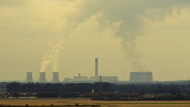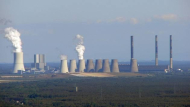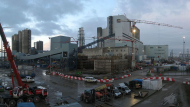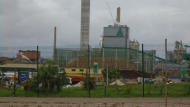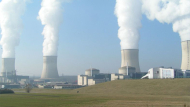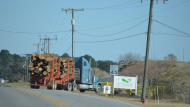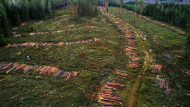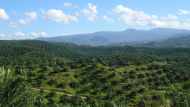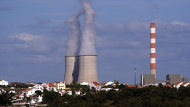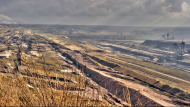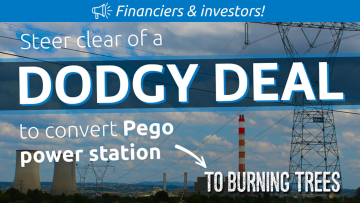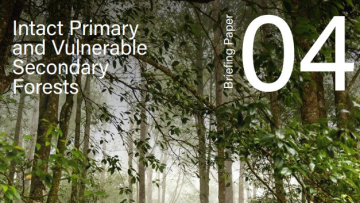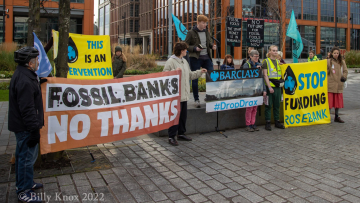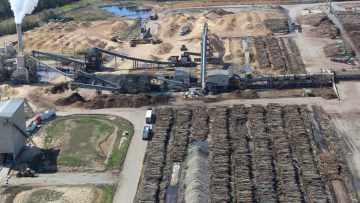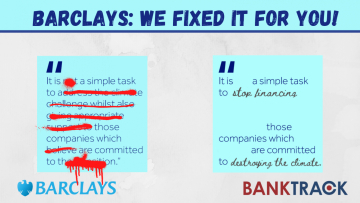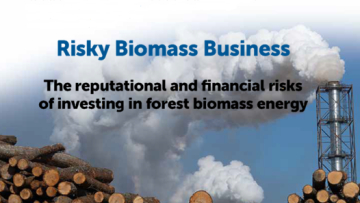Woody biomass is often considered a renewable energy source, but its impacts on nature, climate change, human and Indigenous rights, and its associations with an increased risk of pandemics are significant and it should not be considered a renewable or low-carbon source of energy. Wood biomass combustion releases more CO2 per unit of energy than fossil fuels, contributing to ever increasing global temperatures and exacerbating the climate crisis. The use of wood, especially wood pellets, as the dominant form of biomass for energy generation drives deforestation, the loss of forest ecosystems and significant biodiversity loss. In addition, the biomass industry has far-reaching social and health impacts, including conflicts over land rights and forest resources that threaten the rights, interests and livelihoods of Indigenous Peoples and local communities. There is a heightened risk of respiratory and other diseases for communities living close to both biomass burning and wood pellet manufacturing facilities and these facilities are often located in areas of socio-economic disadvantage where communities are particularly vulnerable to the impacts of climate change.
Biomass production is associated with high rates of deforestation as well as monocultures of various crops. There is a growing body of evidence that shows the connection between deforestation and an increasing risk for disease outbreaks and pandemics. For example,monocultures like eucalyptus plantations reduce biodiversity leaving species like rats and mosquitoes, which are more likely to spread dangerous pathogens, to thrive. This biodiversity decline results in a loss of natural disease regulation and poses a risk for human, animal and environmental health. Studies have also shown that viruses are more likely to transfer to humans when they live in disturbed ecosystems like cleared forests. Finally deforestation is also an important driver of climate change which itself increases the risk for future pandemics.
Read more in our briefing paper: Burning wood in the name of clean energy? How banks are failing to exclude the harmful wood biomass industry from finance
Role of banks
Banks play a role in propping up the forest biomass sector through their finance and investments in companies operating forest biomass power plants, in particular companies looking to convert power plants from coal to biomass. Many banks finance biomass companies or projects as a renewable energy source without differentiating between practices within biomass supply chains and fail to consider the climate impacts that woody biomass has. Large-scale forest biomass causes harm to the climate, environment, people and cannot be considered as a clean energy source and financial institutions investing in the sector could be open to a range of reputational and financial risks. Banks' policies often cite compliance with international sustainability standards to protect and monitor forest carbon stocks in supply chains, such as the Forestry Stewardship Council certification. However, these standards need to be strengthened and banks could play a role in ensuring these standards are improved.
What banks must do
- Exclude direct finance for all new wood biomass facilities, including
- Wood biomass facilities involving energy generation from forest wood, including forest residues and wood from tree plantations and forests
- Wood biomass facilities reliant on bioenergy with carbon capture and storage technologies (BECCS)
- Coal power plants that are being converted to wood biomass power plants or co-firing power plants, where coal and wood are burned together
- Exclude direct finance for new feedstock supply chains for wood biomass facilities, including
- Projects harvesting wood for wood pellets or log wood
- Pellet mills
- Engage with existing clients to call on them to put in place an adequate phase-out plan for their existing wood biomass heat and power infrastructure, and feedstock for wood biomass. The bank should publicly report on the results of this engagement and should cease financing companies that do not show progress towards developing such a phase-out plan.
- Identify wood biomass as a high-risk sector and conduct enhanced due diligence on all existing clients operating within the sector that ensures the social, environmental and health impacts of both wood biomass facilities and feedstock supply chains will be halted and remedied.
Monster on the Horizon (4 minutes)
Over 100 concerned groups are opposing a new biomass energy project in California. The project proposes to burn trees for electricity - by converting them into wood pellets that will be shipped overseas to be incinerated in power plants. Steered forward by GSNR ("Golden State Natural Resources"), the project would harm communities and the climate with massive emissions, and would decimate forests.


